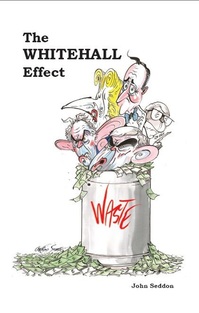|
Philip Johnston in The Telegraph (4/11/2014):
"The Whitehall Effect exposes a bureaucracy that is institutionally resistant to new ways of doing things, perpetuating a system that is both profligate and inefficient... Those who have listened to [John Seddon] have transformed the way things are done, cutting costs and waste while ensuring services are delivered effectively... Seddon argues that “bigger is better” thinking in the public sector is flawed: trying to drive costs down by delivering services on an industrial scale, with their accompanying IT failures, targets, regulations and inspection regimes, actually pushes costs up, he says. The way to save money and ensure “customer” satisfaction is to focus on managing value to the individual recipient of services. Seddon has found that it makes no difference how much money is thrown at a public service such as the NHS if the way it is run and managed is fundamentally flawed. Departmental ministers should read this book and have the words “It’s the system, stupid” pinned up in large letters on the walls of their private offices." Read the full article The Guardian 5/11/2014
The Whitehall ideas machine must go Conservative Home 5/11/2014 We need a shift from Whitehall to local accountability ResPublica - The Disraeli Room The triple whammy that cripples our public services Outsource Magazine The Whitehall Effect David Boyle in The Real Blog - Lib Dem Blog of the Year (10/11/2014):
"Seddon has the most coherent critique and probably the most practical alternative. He is so enjoyably rude to his opponents, the conversations with whom he repeats throughout his new book, The Whitehall Effect, that his old newsletters were required reading in local government. In places like Camden, they have begun to roll out Seddon style systems thinking, and with great effect. But the debate has hardly been joined – because Whitehall is well-insulated against such a fundamental critique. He describes his first encounter with local government in the book, when Swale District Council called him in because the back office system they had been told by the DWP to put in place for housing benefits seemed to be increasing the backlog – as we now know they do. Seddon seems to have nailed the basic problem: imperial systems, like those built by public services during the Blair/Brown years – and especially inappropriate IT systems – can’t absorb the kind of human variety they tend to get. This enormously boosts costs. Now, Seddon’s book has been long-awaited by people like me, who agree with most of what he says, because we were hoping for an answer to the great accountability conundrum – which is this. Without some kind of numerical measures, how are politicians going to hold services to account? And if they don’t use numerical targets, will these not just be imposed on them by the media? Seddon’s answer is this; politicians should set the intentions of services and let managers find the best way to achieve them. ... I’m hoping this book will force the big service managers to engage with the argument in a way they have failed to do so far – and admit that the waters around them have grown. The times they are a-changing.." Read the full article The Scottish Community Alliance (3/12/2014):
"Before the financial crisis struck, expenditure on public services had been growing in real terms each year. Apart from the fact that spending had already reached unaffordable levels, the outcomes being delivered were not matching the amounts being spent. This was the broad conclusion of the Christie Commission and is why public service reform is so high on the Government’s agenda. Many theories are put forward as to why our public services had become so dysfunctional, but one that is particularly compelling is John Seddon’s idea of the triple whammy generated by what he calls the Whitehall Effect." Read the full article |

